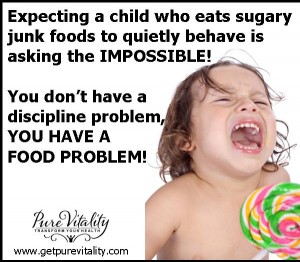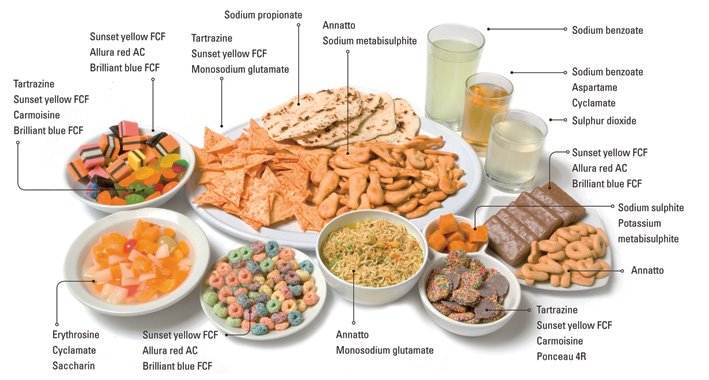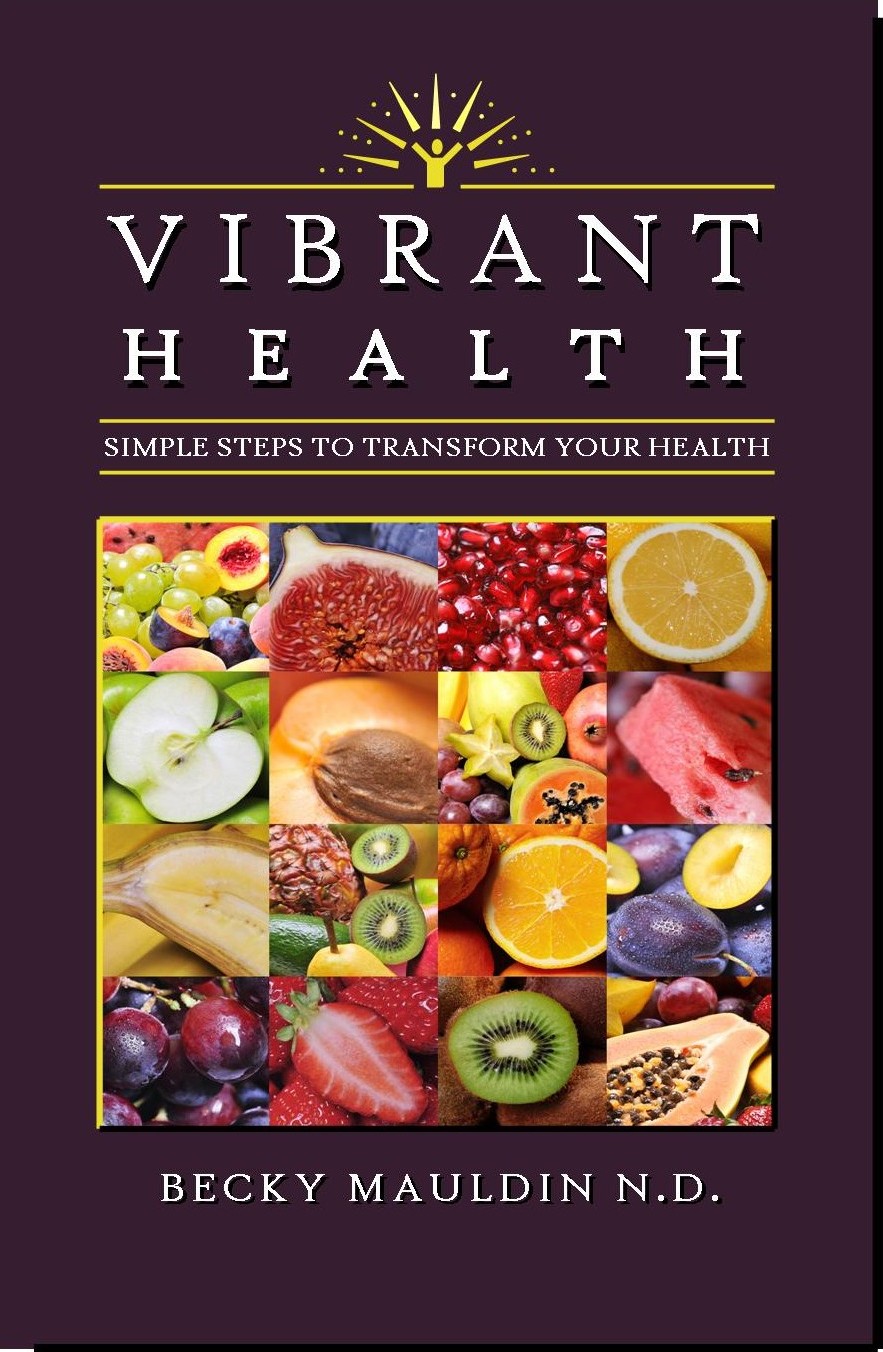It breaks my heart to be walking through the grocery store and see a mom, frazzled and upset because her child is misbehaving, punishing her child. I am troubled because a quick glance in their grocery cart reveals brightly colored packages of manufactured kid's food, loaded with artificial colors, sugar, and preservatives.
 So, who is really to blame for the misbehavior in this situation? Is it really the childs' fault? From looking at the grocery cart, he is probably out of control because he has excessive amounts of sugar, MSG, and other food additives which are causing changes to his behavior, ability to concentrate, and a change in energy level.
So, who is really to blame for the misbehavior in this situation? Is it really the childs' fault? From looking at the grocery cart, he is probably out of control because he has excessive amounts of sugar, MSG, and other food additives which are causing changes to his behavior, ability to concentrate, and a change in energy level.
Or is it the mother's fault? She looks like she is doing the best she can do in the situation, but does it even cross her mind that the real reason she is having discipline problems could be the food that she is buying and feeding to her child?
What food additives do in the body
Just the amount of sugar alone in processed food is enough to cause behavioral problems in children. But then throw in some food additives, and those same kids don't stand a chance. Food additives, artificial colorings and preservatives, have a detrimental effect on the brain of children. Dr. Kenneth Bock, author of Healing the New Childhood Epidemics, found that food additives can effect children’s focus and concentration, and make them easily distracted and significantly more impulsive.
Scientists, doctors, and nutritionists have found that there is a significant link between food additives and exacerbation or onset of ADD/ADHD behavior. A recent comprehensive study conducted by the University of Southampton has solidified this connection. Even children that don’t suffer from hyperactivity exhibit ADD/ADHD behaviors when they ingest these substances. Then the medical doctors solution is to medicate these children, which just covers up the underlying cause of their hyperactivity.
There are thousands of additives present in processed food – artificial colors and flavors are added to make food look more appealing and excite our taste buds to make us crave more.
 Some of the most harmful culprits are sodium benzoate, Blue #2, Yellow#5, Yellow#6 and FD&C yellow and red#40. The best way for parents to guard against their children’s intake of these ingredients is to become label readers. Food dyes are found in a surprisingly large number of foods including salad dressings, snacks, cereals, juice drinks, baking mixes, and even canned fruits and vegetables. The best way to avoid these additives is to buy organic foods and less processed foods- oatmeal and whole grains instead of sugary cereals, fruit or applesauce instead of jello cups or fruit cups, 100% fruit juice instead of juice boxes or artificially flavored drinks, etc…
Some of the most harmful culprits are sodium benzoate, Blue #2, Yellow#5, Yellow#6 and FD&C yellow and red#40. The best way for parents to guard against their children’s intake of these ingredients is to become label readers. Food dyes are found in a surprisingly large number of foods including salad dressings, snacks, cereals, juice drinks, baking mixes, and even canned fruits and vegetables. The best way to avoid these additives is to buy organic foods and less processed foods- oatmeal and whole grains instead of sugary cereals, fruit or applesauce instead of jello cups or fruit cups, 100% fruit juice instead of juice boxes or artificially flavored drinks, etc…
What if she fed her child differently?
How would life be different for the family in the story above if they were eating a more healthy diet? Would the mother be happier and less stressed because her child is well-behaved and her home is a more peaceful environment? The time she had spent worrying and taking care of her unruly child could be spent in other activities that she enjoys. Could the money she had spent on medications to manage his behavior now be used now to buy healthier, organic food?
Would her child have greater potential to excell in school because he can focus and concentrate and therefore go to the college of his choice when he grows up? Would his mother's healthier dietary choices have enabled him to adopt a healthy diet himself as a young adult, preventing him from becoming diabetic and overweight?
What do you think?
**********************************
 Becky Mauldin, N.D. is a Naturopath, teacher, speaker, and author. She has authored two gluten-free cookbooks, Vibrant Health and Recipes for Life. Her story of recovery from an incurable illness has inspired many people around the world. She is known for making a healthy diet achievable for real people and real life.
Becky Mauldin, N.D. is a Naturopath, teacher, speaker, and author. She has authored two gluten-free cookbooks, Vibrant Health and Recipes for Life. Her story of recovery from an incurable illness has inspired many people around the world. She is known for making a healthy diet achievable for real people and real life.
Connect with her on Facebook and let her know what you think of this post.
********************************
This post is linked to: We Are That Family, Kelly the Kitchen Kop, Frugally Sustainable, Gluten Free Homemaker, Day2DayJoys, Little Natural Cottage, Fireflies and Jellybeans, Momnivore's-Dilemma, Healthy Home Economist, The Better Mom







We recently were told by my son's 1st grade teacher that he is having a hard time focusing on his school work. The first thought, is possible ADD – one reason for this is because my husband suffered with this as a child too, and he knows some of the signs to look for as well. Being a family who tries to eat healthy and go natural before we medicate, we are wondering what to do. In all honesty, my children don't get a lot of sugar or processed foods. We tried letting him have a drink with some caffeine just to see what would happen and the teacher said he was like a completely different child – in a good way. Since I don't want to pump him full of caffeine or sugar, what are some suggestions? What are some other routes we can take?
A healthy diet is a great place to start, but sometimes there are other factors involved that need to be specifically addressed. Food allergies can play a huge role in ADD, particularly gluten/wheat and dairy. It could also be related to toxins, such as heavy metals, vaccines, or other environmental chemicals. Each person is different, which is why I would need to see him for a health evaluation to determine what protocol I would use to help him be healthy.
Trying a very strict gluten and dairy free diet is something you can do right away. Doing it for 3-4 weeks should tell you if it’s helping.
You've given me some "food" for thought. I try not t buy junk food but it does occasionally make it's way into the shopping cart. I might re-think next weeks shopping trip.
Oh, that picture with some of the ingredients in each things makes me shudder. When did food stop being food. We choose to go the more simply homemade route rather then extensive label reading and organic. Partially for our stict budget, and also it seems easier.
Thanks for linking up to Healthy 2day Wednesaday. Hope to see you back next Wednesday.
It is not just kids that have trouble with this stuff. I spent many years battling depression and anxiety and only recently found that I have no problems at all when I eliminate dye completely. Even small amounts have a dramatic effect on me, so I can only imagine what happens to such a small body enduring the megadose of these chemicals that seem normal to so many people. I wonder how much of the growing "epidemic" of mental illness we see is because of food additives?